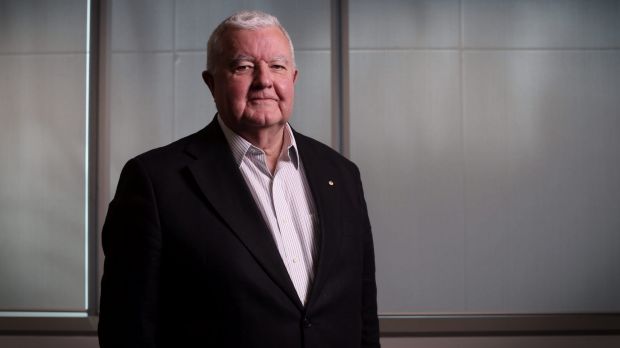
Australia’s Chief Scientist Ian Chubb. Photo: Andrew Meares
Australia’s Chief Scientist Ian Chubb is fast-tracking a public paper on the importance of childhood vaccination in order to try and combat misconceptions about their personal and public value.
As the Disneyland outbreak of measles in the United States – as well as a confirmed case of measles this week on the South Coast of Australia – has reignited debate about vaccinations, Professor Chubb said his office would enter the debate in order to bring the weight of scientific evidence to the fore.
Vaccinations have prevented mortality and disability over decades – particularly in developing countries
Ian Chubb
“The vaccination debate is similar to the climate change debate, in that on the one side you have a very large body of scientific evidence and on the other side you don’t.”
“The evidence is very, very strong that vaccination has protected human beings from many diseases over many decades,” Professor Chubb said.
He was vaccinated – as were his three grown daughters.
“Because of current events, my office is preparing an occasional paper to analyse all of the evidence in greater detail so we can provide greater information to Australian parents. We would then encourage them to talk to their healthcare providers to make sure they get all the advice they need.”
One of the paper’s authors said he hoped the rough draft would be able to go out for external review in a week or so. The document would draw together the most credible and peer reviewed evidence on vaccinations – largely from The Lancet and the World Health Organisation.
“There is overwhelming evidence to support vaccines as one of the most successful and cost-effective health interventions known to humanity,” the researcher said.
“Vaccinations have prevented mortality and disability over decades – particularly in developing countries.”
It was disappointing from a public health standpoint that parents continued to give credibility to debunked theories that vaccinations were linked to childhood disorders, he noted.
It was also disappointing some parents did not understand the concept of herd immunity, in which a majority of children who were vaccinated could help protect the very small number who could not be vaccinated for age or other medical reasons.
Professor Chubb said his office had previously issued an occasional paper in the public health realm on the rise in antibiotic-resistant bugs and how it could lead to common infections becoming life-threatening.
He believed it was important for his office to provide credible and accessible information at a time like this.
“I don’t know whether it will make a difference, but I do hope we can point out what the evidence is, on which side of the debate it falls, and have some influence in the community.”
